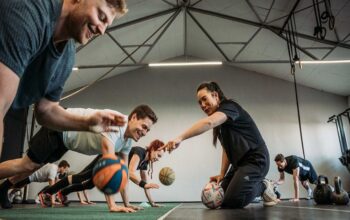Are you looking to build your body muscle?
Bodybuilding is a great way to make your muscles, joints, and bones healthier. It’s a big advantage to those with arthritis and osteoporosis.
So, are you ready to learn how to start bodybuilding? If you feel that you’re ready to commit to a body transformation, here’s a guide to help you know where to start. Read on for seven bodybuilding basics that you need to know before you start your training.
1. Start With A Checkup
A complete physical and mental checkup is a good start before you start bodybuilding. When you take part in moderate to intense training, you have a risk of getting cardiac complications. Earlier detection gives you a better chance of getting the right treatment immediately.
Your doctor can also suggest a specific diet and recommended exercises for your training. Ask for health benchmarks such as cholesterol, blood pressure, and bone density. Knowing these benchmarks can help you know what to avoid and your limitations when bodybuilding.
2. Learn the Factors that Affect Muscle Growth
Three primary factors can affect how your lean mass increases. Read on as we explain the three triggers:
Muscle Damage
Muscle damage points to the micro-trauma that you experience in your connective tissues and muscles. It’s a natural effect when you start resistance training. New muscle cells get produced by the regenerative process from muscle damage.
The more eccentric movements you have, the more muscle damage you get. It helps you build your muscles faster than concentric movements such as the bicep curl’s lifting process. Eccentric exercises involve negative work like the downward motions and lowering of your body during workouts.
Mechanical Tension
Your muscles won’t grow unless they overcome resistance. Working your muscles and contracting them can trigger mechanical tension. The mechanical tension helps disturb the integrity of your muscles, resulting in a growth stimulus.
Workouts with resistance will increase your muscles’ size and contractile power, and strength. The more you can lift weights, the more tension you can produce. Grab some weights or resistance bands to help you grow more of your muscles.
Metabolic Stress
The deep, burning sensation that you feel in your muscles is the result of metabolic stress. It’s the collection of waste products from your anaerobic energy production. Metabolic stress is a powerful stimulus for muscle growth.
Try doing moderate duration and high-intensity workouts to cause burning in your muscles. For example, 45 seconds of body weight squat-to-presses or 30 seconds of sprinting. As long as you put your max-effort, you can build up muscle quickly.
3. Set Realistic Goals
Bodybuilding needs a goal plan when it comes to your performance and physique. Both types of goals can keep you motivated and consistent with how you’ll build your body. List down workouts you should accomplish in the first week and the following weeks.
4. Control Your Weights and Lifts
Beginners often learn how to lift weights by watching. However, if you copy the lift the wrong way, it can delay how you build muscles. A good way to start bodybuilding for beginners is by isolating your muscle groups.
Work for your muscle groups by various angles, exercises, and techniques. Start with small weights, like 3 pounds to 5 pounds. You can slowly work your way up once you’ve learned how to use your muscles rather than your hips thrusting to move the weights upward.
5. Build A Healthy Habit
Your efforts in bodybuilding basics can easily crumble if you don’t check what you eat. Bodybuilding comes in a complete set from a regular workout and having a set diet. Make it easier for yourself by cleaning up your ref and cupboards.
Get rid of all your processed and canned goods. Follow a type of diet like the Whole30 Program, Zone diet, or paleo diet. Change your pantry, freezer, and fridge items. Bodybuilders have a different diet compared to regular ones.
You need more meat and foods reaching at least 3,000 calories per day. Here are some foods you need to include in your daily diet plan:
- Lean meat including sirloin steak and pork tenderloin
- Fish including salmon and cod
- Dairy including oatmeals and popcorn
- Fruits including bananas and watermelon
- Veggies including leafy greens and asparagus
- Nuts including chia seeds and walnuts
- Beans including lentils and black beans
- Oils including avocado oils and olive oils
Limit your intake of alcohol and drinks or foods with added sugar. Avoid eating deep-fried foods like french fries and cheese curds. These can promote inflammation and affect your ability to lose fat and build muscle.
To help you with your bodybuilding, you can take dietary supplements or a testosterone booster. Some of the best supplements you can take include whey protein, caffeine, and creatine.
6. Perfect Your Posture
Your posture plays a role in how much muscle you can make when lifting. Try keeping your lower back slightly arched with your chest up when lifting weights. Your head and neck should be in a natural position when doing your exercises.
You may end up with back injuries if you arch your back during bench press, shoulder press, and bicep curls. A healthy spine and posture come from a strong core. The more you build up your core, the more you can strengthen your muscles, protecting your spine.
7. Finish All Your Reps
Avoid doing multiple sets instead of an all-out, single set of an exercise. It’s an effective plan for building muscles and strengthening. Concentrate on reps that concentrate on your muscles like squats, burpees, and pushups.
Seven Bodybuilding Basics to Help Get You Started
These bodybuilding basics will definitely help you build more muscles more efficiently and quickly. Make sure to go to the doctor before your plan to exercise and create a healthy diet plan. Try not to overdo your bodybuilding plan and stick to your daily goals.
We hope you enjoyed reading our seven bodybuilding tips! Are you looking for more guides related to bodybuilding or exercise? Head on back to our blog page for more helpful articles and information.




